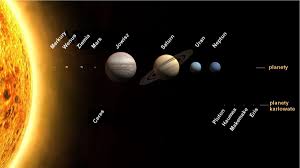7 objawień boskich

Gwiazdy były dziełem bogów. Według wierzenia Greków, powstały za sprawą Zeusa. Początkowo były potomstwem jednego z Tytanów, Astrajosa, a zbuntowawszy się przeciwko Zeusowi, uległy mocy jego piorunów i zdruzgotane rozsypały się po firmamencie świetlistym pyłem… W wierzeniach Sumerów i Akadów (ludu również zamieszkującego dorzecze Eufratu i Tygrysu) oraz Babilończyków — były półbogami. Planety — jako bardziej błyszczące i ruchliwe — uważano za objawienie się samych bogów. Od nich też otrzymały nazwy.
Marduk — najważniejsze bóstwo babilońskiego panteonu — otrzymał planetę największą, poważnie i wolno sunącą wśród gwiazdozbiorów, silnym blaskiem przytłaczającą inne, a mianowicie planetę Jowisz.
Ninurta — władca świata podziemnego — otrzymał planetę Saturn, błyszczącą przyćmionym blaskiem, wyraźnie odmiennym od światła gwiazd.
Nergal — bóg wojny — otrzymał świecącą czerwonym blaskiem planetę Mars.
Isztar — bogini miłości — otrzymała planetę Wenus, jasno świecącą i błyszczącą w czerwieni zórz wschodu i zachodu Słońca.
Nabu — posłaniec bogów, odpowiednik greckiego Hermesa — otrzymał małą, nikle świecącą i najszybciej poruszającą się planetę Merkury.
Było siedem planet. Słońce miało już boga — Szama-sza (u Greków był to bóg regulujący bieg dni i lat, źródło światła i życia — Helios, brat Selene i Eos), Księżyc zaś — boga Sina (u Greków — Dianę, bądź Selenę, u Rzymian — Lunę). Inne planety Układu Słonecznego — Uran, Neptun i Pluton — nie były możliwe do zauważenia gołym okiem, zostały odkryte dopiero w naszych czasach.
Babilońskie nazwy planet zostały z czasem zupełnie zapomniane. Zastąpiły je greckie, a następnie rzymskie i one też do dziś pozostały w oficjalnym nazewnictwie. Nie obrażono jednak żadnego z bóstw. Nazwy greckie były odpowiednikami babilońskich, rzymskie z kolei — greckich (mitologia rzymska przejęła zresztą grecką z całym „dobrodziejstwem” inwentarza).
